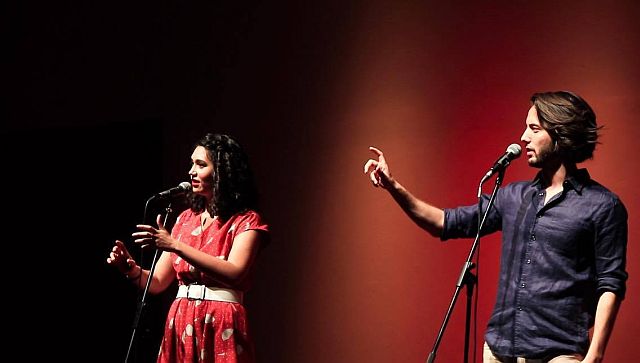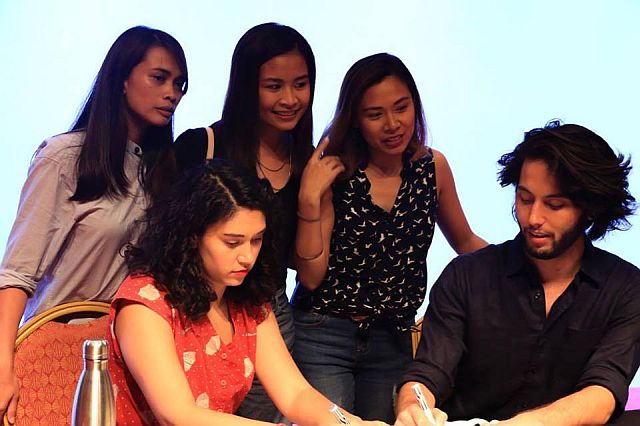
Sarah Kay and Phil Kaye perform “An Origin Story,” one of their well-loved pieces.
photos: Cebu Literary Festival
ONE beautiful thing about writing poetry is finding the right words to relive a moment over and over again.
The experience becomes even bigger when the poet gets to perform his (or her) piece before a live audience around the world, reaching
out and sharing his passion to as many people as possible.
This is something spoken word poets Sarah Kay and Phil Kaye are good at. Or, as they put it, something that they have learned over time.
We caught Sarah and Phil a day before their live performance at J Centre Mall—their second visit in Cebu—and found out that just like most of us, they started writing “bad poems”
before finally coming up with acclaimed pieces, viewed many times over on YouTube by their fans—and for the lucky ones, witnessed live via their performances.
“Thank you so much for being able to wait for us while beingin front of all this food,” quipped Sarah, upon arriving in Circa 1900, where the press event was held. With her, was of course, Phil, sporting longer hair this time. The two celebrated artists, “literary heroes” to spoken word fans, indulged us with an interview. Here are excerpts from that conversation:
Did you have a background in performing before going into spoken word?
Phil: I started acting and performing in theater before this.
Sarah: Poetry was my first entry to any type of performance. Since I was young, I have been doing poetry. Now I take performance more seriously than I did back when I started.
How did you two fall in love with poetry?
P: I have seen spoken word poetry before, when I was 17 years old. I saw another kid my age performing poetry and I didn’t really realize that it was possible. It’s fun.
S: I was lucky that I grew up in New York and there was already an existing poetry scene there. I owe it to New York. All the poets across the country would come to New York and I was able to watch them with their different styles and techniques and I just kind of soaked it up like a sponge. So I got to learn poetry like an “old-school apprentice style,” watching craftsmen do their craft. So that’s how I learned and fell in love with poetry. I had the space to go and see it, which helped a lot, unlike now that we have YouTube, which I didn’t have because I’m a dinosaur (laughs). It’s a similar thing though it’s not the same as watching it first-hand, but YouTube is also an available archive of so many different artists with styles where you can find somebody who will inspire you.
This is your second time in Cebu. How do you find it so far?
S: Lovely! Everyone that we’ve met have been very warm and welcoming. The audience last year was really warm in their response and it’s always really a surprise and a real treat to get to go to a place where you don’t know anybody, but you are not treated as a stranger. Last year, that was really very special.
When did you realize that you have a strong fanbase here?
S: We figured it out when we put up tickets. I would get a lot of e-mails for my websites from the region. Last year, when we found a venue that has a seating capacity of 400, there was a miscommunication. They announced it before we were ready and that was basically the first time we couldn’t
access the website.
P: We thought it was a glitch that the website had gone down.
S: It is a big honor. The show in Manila is the biggest show we have ever done. We don’t usually have that much people who want to watch us, but certainly it makes us feel more loved.
Are you open to your poems getting translated into different languages?
S: Yes, it’s cool. But ours is very difficult to translate because there are a lot of puns. We write poems because it’s fun to play with language, in finding the right words for every moment that practically there’s no such thing or the right words. Similarly, translations are fun because you are trying
to find words to move one expression to another language so you have to find the right words twice. You have to match one right word to another—it’s an imperfect work that is kind of delightful. A lot of our works are in performance and there’s a lot of mis-hearing, it’s part of translation or
mistranslation that would never fail to make me laugh. I have a poem about women empowerment and there’s this part that says, “if you grow up the type of women men want to touch, you can let them touch you. Sometimes it’s not you that they are reaching for. Sometimes it’s a bottle. A door. A sandwich. A Pulitzer.” And people on the Internet misheard it and have writtenit out sometimes as, “ … as a bottle, a door, a sandwich and a pole dancer … “ (laughs).
How do you deal with writer’s block?
S: I think writer’s block is a code for “everything I’m writing is bad.” There is no such thing as “can’t write”… it’s not like someone tied all your pens and move it all from your house… that’s not true. Sometimes it actually feels like there’s nothing happening. Stop working so hard. Just write what needs to be written. You can start with writing to people you should not be writing to. The act of writingis the act of writing. You have to write through writer’s block. There’s no way to pass that.
P: For me, writer’s block is an obsession of perfection. It’s the idea that the next thing I write is the most beautiful that I am going to write, and that would freak out anybody. When I experience writer’s block, I just take that expectation.

The poets sign books for fans.
What’s your take on the saying “there is no money in art” as you have made a profession out of your passion?
S: It’s slightly misleading, right? Because no one sits on their desk and just write poems; that doesn’t happen. We have a career that
allows us to perform and teach in schools and sometimes, perform and teach not in schools, and that really relies on our work as facilitator.
Unfortunately there’s that misconception that you don’t come as a real artist unless they pay you for your art. But that is not true and helpful. What is important is you find that form you just enjoy and brings joy in life and then you do the work in the best part that you can be. And find a community that feeds you and that you can feedin return, and for doing both of those things, then you will get by.
If someone comes to pay you for your work, that’s awesome. If it happens that you also need a day job, that’s also awesome. And if happens all the time and you don’t need a day job, incredible. But none of that concludes the first part which is doing the best that you can for the art form.
P: What is wonderful about poems is that you don’t need other things to create them, like expensive cameras and all. If you wanted to start, then you start writing it.
Do you still get nervous while performing? How do you overcome it?
P: Certainly nervous often, and also forgetting a line more often.I used to think that when I got on stage everyone is waiting for me to mess up, but it’s not really true. If you only feel that positive potential energy, it is much less scary to be interacting with a live audience.
S: I think people would come to see spoken word poetry because they want to see humans being humans. No one comes to see us thinking they are going to see robots. If you are being a human and you messed up, no one’s going to get “HAAAAAA, human” but they are okay, great. For the most part, the audience is really good at understanding vulnerability. If you forget a line, the audience is not going to panic and get mad. They would say that they are with you, and that support is really helpful. And also you have to calm down and be aware of what’s happening.
People think that if they are nervous, they can’t have a good time and do a good show. But those two things are not exclusive because most of the time, we are nervous and we are also enjoying ourselves. Because if you are not enjoying it, then why are you here? There has to be reason why you are here, and want to be here. You have to remember that though you are nervous, you are also stoked, it’s a lot easier to perform on stage.
What is your advice to young writers who are holding back because they think they are writing bad poetry?
S: Stop being afraid of writing bad poems. You have to write bad poems—that is how you get better at it. No one pens a perfect poem on their first go, or even on the 50th go. This is something that we work hard at. Before we get to perform it on stage, we spend so many hours in making it as good as it can be before we put it in front of people and when they see it, they would get easily discourage claiming they are not good like that and so they can’t and won’t do it. My piece of advice is that they have to be okay with writing bad poems.
P: I think there’s an expectation for some reason in creativity, that it’s something that you are really have to be good at, or not. Something that you have or you don’t. Like basketball. I was pretty terrible at it because I never played it before but when I started playing it more, slowly I was getting better and better. And I think people don’t understand that, like you can’t play basketball for some reason, if you are not
LeBron James. People should give themselves the permission to fail.



